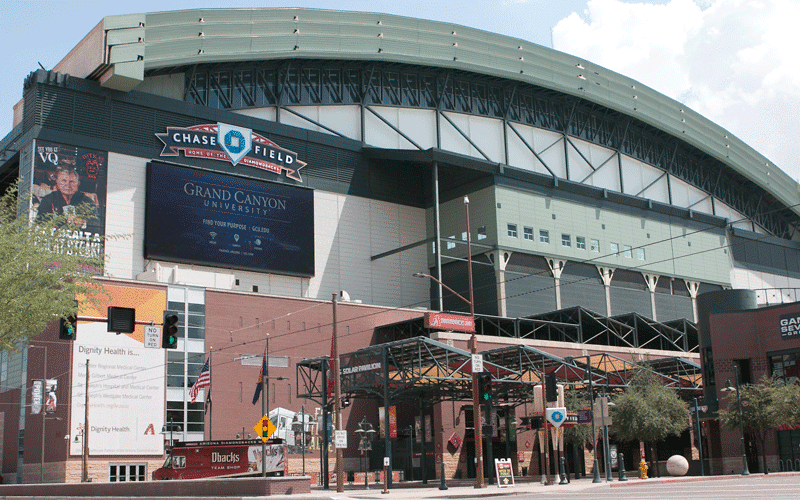
At its fourth annual Diversity Business Summit at Chase Field Tuesday, MLB hosted a panel that included a deaf former player, a female baseball executive and a gay former player, all talking about the challenges they faced and their efforts to get others to accept differences. (Photo by Cronkite News)
PHOENIX – After introducing the Diversity and Inclusion panel Tuesday at MLB’s Diversity Business Summit, even moderator Harold Reynolds had to take a moment to remark on the impressive collection of baseball lifers.
“That’s some group you put together,” Reynolds said to Wendy Lewis, the MLB executive who organized the event.
Seated on the third base dugout of Chase Field in front of a large group of young professionals were five baseball people, each there with a unique story to tell, but all connected by a common accomplishment – overcoming the odds to achieve success in the sport and serve as an example for those who might not otherwise consider baseball a possibility.
After a candid conversation with Commissioner Rob Manfred about the bottom-line business implications of diversity, the focus turned to the human stories of those who blazed the trail.
Kim Ng, a former Yankees and Dodgers assistant general manager who now serves as the league’s vice president of baseball operations, was the only woman and the only Asian-American on the stage. This was not an uncommon circumstance for Ng.
“When I walk into a room, I have to overcome what people’s preconceived notions are,” Ng said, after Reynolds gave her a ringing endorsement to become the first female general manager in Major League Baseball. “For me, it makes me feel like I have to get out there even more to turn the room and to make them understand who has the decision-making power.”
That challenge doesn’t just come up while talking to players or scouts, it’s a problem she says follows her wherever she goes in the ballpark.
“I have to talk security guards into the idea that, no I am not the translator. No I am not media,” Ng said. “Every day, guys. Every day. I think I had to work at Dodger Stadium for five years before they figured that out.”
Diamondbacks’ 2001 World Series hero Luis Gonzalez may never have been mistaken as the translator walking into Chase Field, but he was often expected to perform that function.
“I wish I would have got extra pay for doing it,” Gonzalez, now a special assistant to the team president, joked. “But that didn’t happen.”
Gonzalez had his own barriers to overcome in addition to helping other Latinos communicate. His parents emigrated from Cuba right before Fidel Castro took power. But one eye-opening experiment came years after he broke into the big leagues, when Gonzalez’s hearing was temporarily taken away.
The purpose was to demonstrate what it was like to play baseball deaf, something that panel-mate and former MLB journeyman outfielder Curtis Pride didn’t need any help understanding. Pride was born almost completely deaf, with 95 percent hearing loss. He played 11 major league seasons, with an additional 12 years in the minor leagues.
“I had to wear ear buds where I couldn’t hear anything and I have great respect for Curtis, playing 23 years doing what he did,” Gonzalez said. “Players are yelling I got it and he can’t hear that. You get a fly ball and the challenges he had… you have a new respect for that.”
“If I call for it, it’s my ball. It doesn’t matter if I’m playing left, right or center it’s always my ball. You gotta get out of the way,” Pride said, adding that in his 23 years playing he never had a collision.
Billy Bean, the former Padres outfielder, played six MLB seasons while living what he called “a double life.” The once-closeted gay player didn’t open up about his personal life publicly until after his career ended. Now he works for MLB as the league’s first vice president of inclusion and social responsibility.
Bean is now committed to helping players better understand the LGBT community and encouraging an atmosphere in which gay players can open up and be true to their identity.
“I want baseball people to see an example that they can relate to. Because the concept is still new… Some days it still feels very uncomfortable,” Bean said. “I hope that hiding part goes away.”
LaTroy Hawkins, a 21-year veteran reliever, retired after last season. He said he believes the culture in MLB clubhouses is evolving.
“Is it still an elephant in the room? Not like it used to be, because of what Major League Baseball is doing now – promoting inclusion,” Hawkins said of gay players in the clubhouse. “I would say 80 to 90 percent of players, they don’t care.”
For commissioner Manfred, it’s events like this summit that will advance baseball’s evolution.
“We think about diversity as a business imperative,” Manfred said. “Our society is increasingly diverse, so in order to sell our game we need our product out here [on the field] to be diverse, and we need people to understand that there is diversity at the very highest levels of the game.
“It’s not just because it’s the right thing to do, and we don’t need to quibble about that, but it’s necessary for our business.”
Manfred acknowledges that different people will connect to baseball in different ways. Whether it be the stickball games that Ng played as a little girl in Queens that turned her on to the sport, or the summer home run derbies a 6-year-old Manfred competed in growing up, they know it doesn’t always take organized ball, sometimes just exposure to the joy that baseball can provide, to get kids hooked.
“This ground-up approach takes patience, hard work and commitment in terms of dollars, but we are really convinced it pays off,” Manfred said.